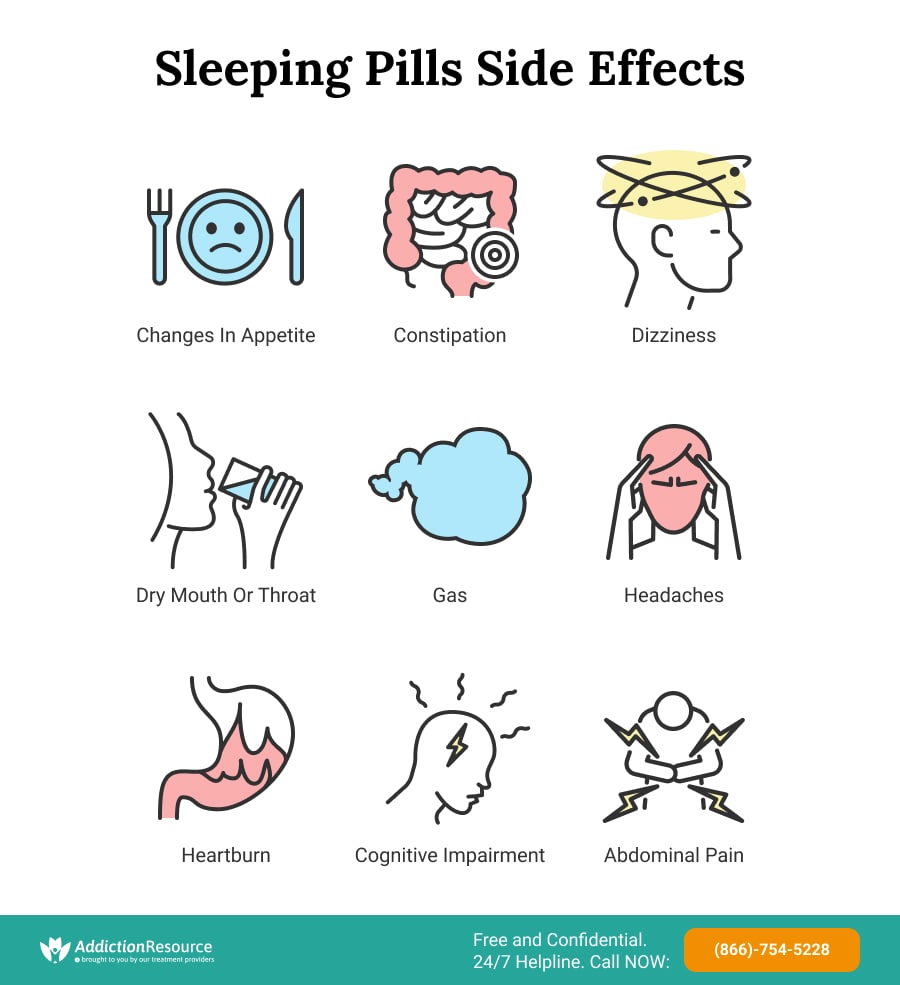The majority of Americans will struggle with sleep difficulties at some point in their lives, and often, they turn to sleep medication for the solution. However, few pay attention to the potential sleeping pill side effects before taking these medications. Users should question if sleeping pills are bad enough to avoid or the imperfect solution they need.
Learn About Sleeping Pills:
- What Are Common Sleeping Pill Side Effects?
- What Are Rare Sleeping Pill Side Effects?
- What Are Severe Sleeping Pill Side Effects?
- What Are Signs of Sleeping Pill Allergy or Intolerance?
- Do Sleeping Pills Have Black Box Warnings?
- Are There Sexual Side Effects of Sleeping Pills?
- What Variables Impact Side Effect Emergence?
- How Can Sleeping Pill Side Effects Be Reduced or Eliminated?

Common Sleeping Pill Side Effects
As many as 70 million Americans suffer from chronic sleep problems, and plenty of these individuals turn to sleep aids for help in battling them. Out of those who use these medications, approximately 80 percent of them will experience negative effects of use. The majority of these are common sleeping pill side effects that, while not desirable, usually aren’t debilitating or life-threatening.
These can be caused by both prescription and OTC sleeping pills. However, prescription versions tend to come with a greater number of side effects. Some common side effects of sleep medication include:
- Unusual nerve sensations in the extremities, such as burning or tingling
- Changes in appetite
- Constipation
- Diarrhea
- Struggles with coordination
- Dizziness
- Drowsiness throughout the day
- Dry mouth or throat
- Gas
- Headache
- Heartburn
- Impairment the next day
- Problems with attention, memory, and mental processing
- Abdominal pain or tenderness
- Uncontrollable shaking of a part of the body
- Unusual dreams
- Weakness
None of these side effects of sleeping pills are desirable. However, for some people, they may be preferable to living with the effects of their sleep disorder. Whether or not sleeping pills are bad needs to be evaluated on an individual level.
Rare Sleeping Pill Side Effects
Less common sleep aid side effects tend to be more problematic than the ones experienced more frequently. These can make use of the medications so uncomfortable that their benefits do not outweigh the risks. In some cases, they can prove to be life-threatening.
Unfortunately, the groups who are most likely to experience these less common and more severe side effects are also those more likely to have trouble with sleep. These include those who are overweight or obese, smokers, alcoholics or heavy drinkers, and physically inactive individuals. Some of these less common effects include:
- Impaired vision
- Muscle cramps
- Emotional blunting
- Depression
- Anxiety
- Insomnia
- Aggression
If someone is experiencing these side effects, chances are sleeping pills are dangerous to them and their use should be discontinued under the supervision of a medical team.
Severe Sleeping Pill Side Effects
Some of the rarest side effects of sleeping pill use are also the most concerning. Unlike the majority of other side effects, these have the potential to be deadly. If someone experiences any of the symptoms of use listed below, they should seek medical attention immediately.
- Respiratory depression
- Parasomnias, like walking, eating, and driving while asleep
- Heartbeat irregularities
- Abnormal body movements
- Excessive sedation
- Slowed reflex times
- Serotonin syndrome
- Coma
- Death
It is important to note that certain behaviors can increase the chances of these dangerous side effects occurring. Taking more of the pills than prescribed or indicated on the bottle significantly raises the chances of experiencing these effects of use. How many sleeping pills can cause death will vary between medications and users. Mixing sleeping pills with alcohol and other substances also increases the risk of experiencing dangerous and deadly symptoms of use.
Users can avoid these dangerous effects in the majority of cases by understanding how the pills work, taking them as directed, and knowing how long do sleeping pills last so they can plan things such as drinking socially around them.
Additionally, pregnant women and those who are breastfeeding must consider the risks to the fetus and baby. Using a sleeping aid while pregnant or breastfeeding means passing on at least some of the medication to the child, putting them in danger.
Signs of Sleeping Pill Allergy or Intolerance
As with all medications, it is possible for users to be allergic to or intolerant of sleep aids. Anyone taking them should be aware of the signs of an allergic or intolerant reaction as these can turn deadly. Signs of a sleep aid allergy or intolerance include:
- Blurred vision or any other vision changes
- Chest pain
- Difficulty breathing or swallowing
- Feeling that the throat is becoming more narrow
- Hives
- Hoarseness
- Itching
- Nausea
- Pounding heartbeat
- Rash
- Shortness of breath
- Swelling of the eyes, face, lips, tongue, or throat
- Vomiting
If any of these are observed, medical attention must be sought immediately.
Sleeping Pill Black Box Warnings
As of April 2019, numerous prescription sleep aids are required to come with a black box warning. This type of warning is the most serious the FDA issues without removing a medication from the market. It indicates that there is a consensus in the medical community that sleeping pills are dangerous, more so than most other medications, but at least for now, they have a therapeutic benefit that keeps them on the market.
The black box warning is a result of dangerous behaviors users may engage in while asleep. These include things such as driving, walking around, leaving the home, and taking actions they otherwise would not while awake—such as playing with weapons, taking additional medication, drinking, or even committing suicide.
Sleeping pill hallucinations while asleep or awake are also quite dangerous. Doctors must inform patients of the black box warning prior to prescribing the medications.
Sexual Side Effects of Sleeping Pills
The sexual side effects of sleep aid use are varied. Some people specifically take them to engage in sleeping pill sex, which they report to be more euphoric, or to increase their sex drive. At the same time, many users report that sleep aids have a negative impact on their sex life. Sleeping pill sex-related side effects include a lack of desire, struggles with lubrication, decreased sensations, and even erectile dysfunction. If someone is considering using these medications to benefit their sex life, they would be better off talking to a doctor about therapies that specifically address sexual health and satisfaction.
Variables That Impact Side Effect Emergence
How and why side effects emerge comes down to numerous variables, making it impossible for doctors to determine if sleep aids will cause adverse reactions or not. These variables include everything from personal factors to social elements. Some factors that can determine if someone will experience adverse symptoms of use include:
- Age
- Gender
- Maternity status
- Organ health
- Weight
- Fat distribution
- Age
- Use of other medications or substances
- Race and ethnicity
- Dose taken
- Frequency of use
- Presence of diseases
It is important to note that long-term use of sleeping pills increases the risk of negative reactions occurring. Most sleep aids are meant to be used only for a few days or weeks.
Reducing or Eliminating Sleeping Pill Side Effects
Anyone struggling with sleep will want to know if they can reduce or eliminate the side effects of over-the-counter sleeping aids or prescription medications. There are a few things that can be done, but there is never a guarantee that no side effects will occur.
The first thing a user can do to reduce or eliminate side effects is take the medication as directed. This means never taking a higher dose than indicated, taking the medication only right before bed, and not taking it longer than a few weeks at a time.
Users can also reduce or eliminate side effects by being healthier in general. Eating right, drinking enough water, exercising, and not engaging in unhealthy habits means the body is more likely to respond well to medication. However, much of what causes side effects is beyond the control of the user. For those who are unable to escape the side effects of prescription medications, natural sleeping pills may be best.
One of the side effects of sleeping pill use is addiction, and those who abuse these medications need a treatment plan for substance abusers. Anyone who is addicted to sleep aids can get help with stopping use safely. By turning to the best rehabs in the U.S., a better life is possible.
Page Sources
- Sleep Disorders and Sleep Deprivation: An Unmet Public Health Problem. Institute of Medicine (US) Committee on Sleep Medicine and Research; Colten HR, Altevogt BM, editors. Washington (DC): National Academies Press (US); 2006. https://www.ncbi.nlm.nih.gov/books/NBK19961/
- Timothy Fitzgerald, Jeffrey Vietri. Residual Effects of Sleep Medications Are Commonly Reported and Associated with Impaired Patient-Reported Outcomes among Insomnia Patients in the United States. Sleep Disord. 2015; https://www.ncbi.nlm.nih.gov/pmc/articles/PMC4689974/
- Short Sleep Duration Among US Adults. Data and Statistics. Centers For Disease Control And Prevention. https://www.cdc.gov/sleep/data_statistics.html

 Authored by
Authored by  Reviewed by
Reviewed by 


